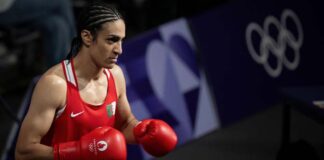SHORT OF war, sport between nations is the best way to generate, express and manufacture “national pride”. How else can you “go for” your country?
Millions of people enjoy sport. Precisely for that reason it is big business. Adidas, Nike, Puma and Reebok are all household names, selling us the “sporty” look and making billions of dollars in profit.
Socialists understand why people take part in and watch sport. It is an escape from the harsh world of work.
However, the nationalism of the Olympics is something worth arguing over. The International Olympics Committee (IOC) motto is “Faster, Higher, Stronger”—but to what end?
The nationalism is truly nauseating when any Australian wins anything—think of a certain crook named Alan Bond who won the until then obscure US yacht racing trophy the America’s Cup in 1983. But this will pale into comparison should Australian athletes win gold in Beijing.
International sporting competitions have always been bound up with political nationalism. When Baron Pierre de Coubertin dreamed up the modern Olympics in the 1890s it was an era of intense rivalry between the world’s strongest powers.
The idea that athletes would compete as individuals was done away after three Olympics in favour of competing as national teams.
The Berlin games in 1936 provided the Nazis with a platform to show the world Germany’s new strength and Hitler’s white supremacist vision. They invented the torch relay to add to the spectacle. Famously, African American athlete Jesse Owens stole the show by winning four gold medals.
Nationalism obscures the class divide in our society and helps divide us from others across the globe. It is a ruling class ideology used to bind workers to “our” bosses’ project of accumulating wealth and power for themselves.
Liberal PM Malcolm Fraser started the Australian Institute of Sport (AIS) after the “disaster” of no gold medals for Australia at the Montreal Olympics in 1976.
Modelled on the East German “athlete factories”, the AIS was the price to pay for cultivating nationalist sentiment—no matter how many millions of dollars it cost. Estimates are each gold medal at Beijing will cost about $40 million.
As a good antidote, I recommend the book the IOC tried to ban, The Lords of the Rings by Vyv Simson and Andrew Jennings, which details the history of corruption and scandal surrounding the Olympics.
by Tom Orsag




